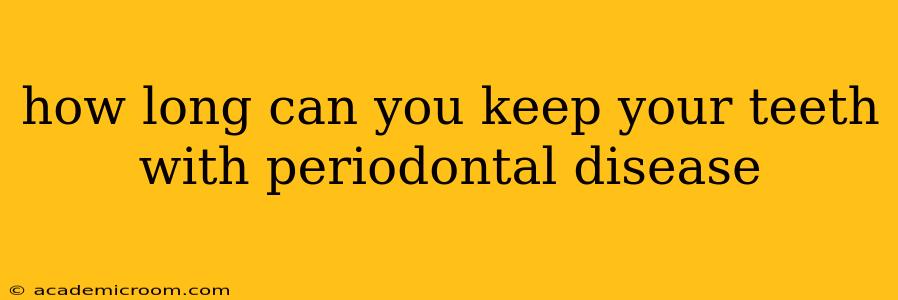Periodontal disease, also known as gum disease, is a serious infection that damages the soft tissues and bone supporting your teeth. Left untreated, it can lead to tooth loss. But the question of how long you can keep your teeth with periodontal disease is complex and depends on several crucial factors. There's no single answer, but understanding these factors empowers you to make informed decisions about your oral health.
What is Periodontal Disease?
Periodontal disease is a progressive condition. It begins with gingivitis, a mild form of gum inflammation characterized by red, swollen, and bleeding gums. If gingivitis isn't treated, it can advance to periodontitis, a more severe form that damages the bone and tissues holding your teeth in place. This damage can lead to loose teeth, pockets forming between your teeth and gums, and ultimately, tooth loss.
Factors Affecting How Long You Can Keep Your Teeth
Several factors influence the progression of periodontal disease and, consequently, how long you can retain your teeth:
1. Severity of the Disease:
The stage of periodontal disease at diagnosis is crucial. Early-stage gingivitis is much easier to treat and reverse than advanced periodontitis, which may have already caused significant bone loss. Early intervention is key.
2. Age and Overall Health:
Older individuals and those with underlying health conditions like diabetes are often more susceptible to periodontal disease and experience faster progression. Chronic diseases can weaken the immune system, making it harder to fight off infection.
3. Oral Hygiene Practices:
Maintaining diligent oral hygiene, including brushing twice daily, flossing regularly, and using an antimicrobial mouthwash as directed by your dentist, significantly impacts disease progression. Poor oral hygiene accelerates the disease.
4. Genetic Predisposition:
Some individuals are genetically predisposed to developing more severe periodontal disease, regardless of their oral hygiene practices.
5. Lifestyle Factors:
Smoking, excessive alcohol consumption, and a poor diet all negatively affect oral health and increase the risk of periodontal disease progression. These habits compromise the body's ability to heal and fight infection.
6. Access to Dental Care:
Regular dental checkups and professional cleanings are essential for early detection and treatment of periodontal disease. Consistent monitoring and professional intervention are vital for managing the condition and preventing further damage.
How to Preserve Your Teeth with Periodontal Disease
Even with periodontal disease, you can take steps to preserve your teeth:
- Maintain meticulous oral hygiene: This is your first line of defense.
- Visit your dentist regularly: Professional cleanings and examinations are crucial for early detection and treatment.
- Follow your dentist's treatment plan: This may include scaling and root planing, antibiotic therapy, or surgical procedures.
- Address underlying health conditions: Controlling conditions like diabetes can improve your body's ability to fight infection.
- Quit smoking and reduce alcohol consumption: These habits significantly worsen periodontal disease.
- Eat a healthy diet: A balanced diet supports overall health, including oral health.
Can Periodontal Disease Be Reversed?
While advanced periodontitis cannot be completely reversed, its progression can be halted, and further damage can be prevented with appropriate treatment and diligent oral hygiene. Early-stage gingivitis is often reversible with improved oral hygiene.
What are the Treatment Options for Periodontal Disease?
Treatment options vary depending on the severity of the disease and may include:
- Scaling and root planing: A deep cleaning to remove plaque and tartar from below the gum line.
- Antibiotics: To combat bacterial infection.
- Surgical procedures: Such as gum grafts or bone grafts, to repair damaged tissues.
Ultimately, the length of time you can keep your teeth with periodontal disease is highly individual and depends on various factors. Proactive care, regular dental visits, and adherence to your dentist's recommendations are crucial for maximizing the chances of retaining your natural teeth for as long as possible. Don't hesitate to schedule an appointment with your dentist if you have concerns about your gum health. Early intervention is key to successful management of periodontal disease.
